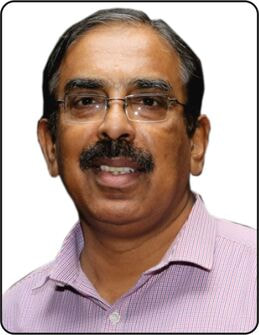|
Jacob is an accomplished Human Resources and Industrial Relations professional working as Vice-President -People Experience at SKF India Ltd. He has over 3 decades of diverse experience spanning across sectors like engineering, textiles, power, and infrastructure at various organizations including ABB India, KEC International, Kirloskar Oil Engines, and Heavy Engineering Corporation. Jacob is a silver medalist and holds a Master's Degree in Personnel Management and Industrial Relations from XISS, Ranchi. As an industry stalwart, he has contributed immensely towards establishing excellent employee work culture and ensuring seamless people processes at organizations. He has been instrumental in signing more than 10 long-term wage settlements with various Employee Unions. Jacob is an accomplished trainer and specializes in leadership development, team building, and conducting assessment centers. Jacob is a fitness enthusiast and in his free time, he likes to read English novels and play the synthesizer. 1. How do you describe yourself? I am a person who strongly believes in building personal relations both at work and otherwise. Being an HR Professional allows me to touch people's lives in the organization where I work. Simplicity and gratitude in life are fundamental that make life enjoyable for me. 2. What is the definition of ER /IR according to you? Call it Employee Relations or Industrial Relations, for me it's the critical factor in manufacturing organizations that focuses on creating trust between the Management and employees. This trust becomes the basis for a conducive environment where the business is fully supported by the employees & Union for any change initiatives and productivity/growth improvement. This will ensure the growth of the organization and the employees. 3. What are your views on the biggest challenges ahead for the next generation of IR leaders? There is a real dearth of IR Leaders in the industry, and the HR fraternity is largely responsible for this situation because many CHROs do not consider IR as critical. The IR professionals are often treated lower than their counterparts in core HR, which focuses only on white-collar employees. Some leaders often come to IR for a short period only and do not get a deeper understanding of the ethos. Further business schools are also not focusing on this subject for the MBAs. Hence in the future, there is bound to be a challenge in having IR leaders who are Strategic and Visionary in approach, thus building a long-term IR roadmap of organizations. Challenges for these breeds of IR Leaders will be managing the people aspect when organizations are fast adopting digitalization in operations. Ensuring the acceptance of these technologies and also preparing the workforce competence is going to be critical. A further challenge is managing the aspirations of the Z Generation. 4. If you were a union leader, what advice would you give to current workers union leaders? Understand the realities of business and be logical in creating expectations among the members. Take BOLD decisions in the interest of business with a long-term view. 5. Union leaders are stronger than many current IR professionals! Your comments. In Industrial Relations, there should not be a situation where either the IR Manager or the Union leader is stronger. Both should be partners, with. However, if any leader does not have the right personality and competence, they would be weaker than the union leader. I do not agree that in all cases union leaders are stronger. Yes, there are many organizations where this may be true because of the lower leadership capability of the IR leaders. Hence there has to be a focus on capability building. 6. New Labour Codes – Ease of Doing Business. Do you think this will come true in reality? I have studied the Codes quite deeply. Yes, there is an effort to promote ease of doing business in terms of reducing the number of returns, provision for online submissions, rationalization of licenses, etc. But these will have a limited impact of creating the right ecosystem for business. We also need to keep in mind that a country like ours cannot have laws like American or Europeans because of the mindset of employers and employees in those nations. Let us also see what behavior changes happen in the enforcing authorities now that the codes expect them to be facilitators in promoting compliance. The larger impediment to ease of doing business comes from the political goons and local population, wherein the government authorities normally are influenced by politicians. Also, our overall mindset of ours in terms of work culture needs transformation. 7. Name the top 3 labour laws that all HR professionals must know. That's a difficult question. However, a basic understanding of the Factories Act, Shops& Establishment Act, Industrial Disputes Act, Payment of Wages, Minimum Wages, and Social Security Acts (Bonus, Gratuity, PF, ESI) is a must. 8. The industry will face a huge shortage of competent IR professionals in the next few years. Who is responsible for this, and how can this crisis be mitigated? CHROs of companies are the culprits for this scenario. There is a general messaging being done by the HR Professionals that IR is fading away and hence need not be focused. IR Professionals are not valued in many organizations, and therefore few youngsters don't want to try their hand at IR. All these can be changed if HR Leaders of organizations ensure that the best HR professionals are given IR Responsibility for a part of their career, and the importance of IR in business sustainability is highlighted to the Management, thus making it a key contributor to the business. This is creating a sense of being Valued by the IR Leaders, and more professionals would want to be in IR. 9. Explain the one complex IR issue that you handled/faced. In the last 33 years of being in this profession, there have been so many complex situations that I have handled. Each one has been a learning, and am still learning from each new challenge. One that comes to my mind as unique is a strike of 15 days in a factory because of the EGO of the General Manager. A very simple situation got out of control because of the adamant and illogical approach of a general manager, finally resulting a strike. Subsequently, the matter was resolved with the intervention of the district administration. 10. What are your tips for creating a strong professional rapport between HR and union leaders? The HR Leader has to always remember that the larger Accountability of Building relations with the Union rests on his / her shoulder. Be authentic, open, and transparent with the Union Leaders and they always reciprocate. There could be some hard nuts who will take more time to come around but eventually, it happens. Efforts should be made to have a data-based discussion and avoid unwanted arguments. Building the leadership capability of Union leaders is also critical. Dialogue is one of the keys; always remember that the IR Manager's personality is critical in building the relationship. 11. Are IR issues rising because organizations are not focusing on building union leadership development? I am not sure whether IR issues are rising or not. However, organization generally invest in Management Leadership development only and do not focus on Union Leadership. There are many progressive organizations that invests in the Union Leadership development because they believe that Union is a partner in business. And it really pays to develop the Union Leaders because it helps them to understand business and play the role of catalyst in resolving the situation. 12. The fundamental Success Mantra of IR is “Line managers are HR Managers.” Is this true? Yes, this is fundamentally true. HR should invest in developing the capability of Line Managers to manage the shopfloor people's challenges. This way, escalations of minor issues into disputes can be reduced, and also the interference of union leaders at the shopfloor level. The IR Manager can then focus more on Strategic Aspects that are spending time on firefighting. 13. What are some strategies that can help young IR professionals achieve the success they want in their careers? There is no shortcut to success. Continuous learning and hard work is the mantra. Be an authentic human being and transparent in dealings. 14. You are an IR leader, what advice that you give to Union leaders and business leaders? Always keep the Business interest at the foremost. Union Leaders and Business Leaders can succeed only if the business has sustainable growth. Be transparent and open in dealing with each other. The Union leaders will have to manage some politics to maintain their position, but it should not be at the cost of harming the business. Union leaders must understand we are in a VUCA world, and only those who are Agile will survive. Business leaders, along with the HR leaders, should make efforts to enhance the business knowledge of union leaders and involve them as partners in running the business. This mindset is the key to having a harmonious IR.
0 Comments
Leave a Reply. |
ArchivesCategories
All
|
||||||
SITE MAP
SiteTRAININGJOB |
HR SERVICESOTHER SERVICESnIRATHANKA CITIZENS CONNECT |
NIRATHANKAPOSHOUR OTHER WEBSITESSubscribe |
MHR LEARNING ACADEMY
50,000 HR AND SOCIAL WORK PROFESSIONALS ARE CONNECTED THROUGH OUR NIRATHANKA HR GROUPS.
YOU CAN ALSO JOIN AND PARTICIPATE IN OUR GROUP DISCUSSIONS.
YOU CAN ALSO JOIN AND PARTICIPATE IN OUR GROUP DISCUSSIONS.
|
|



 RSS Feed
RSS Feed





